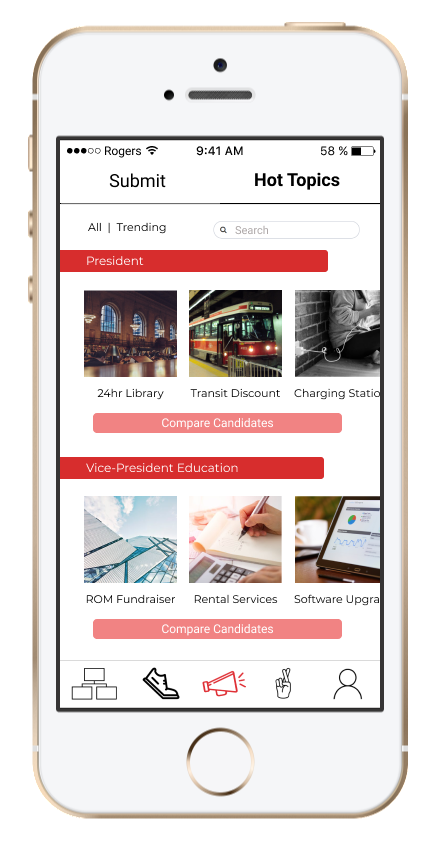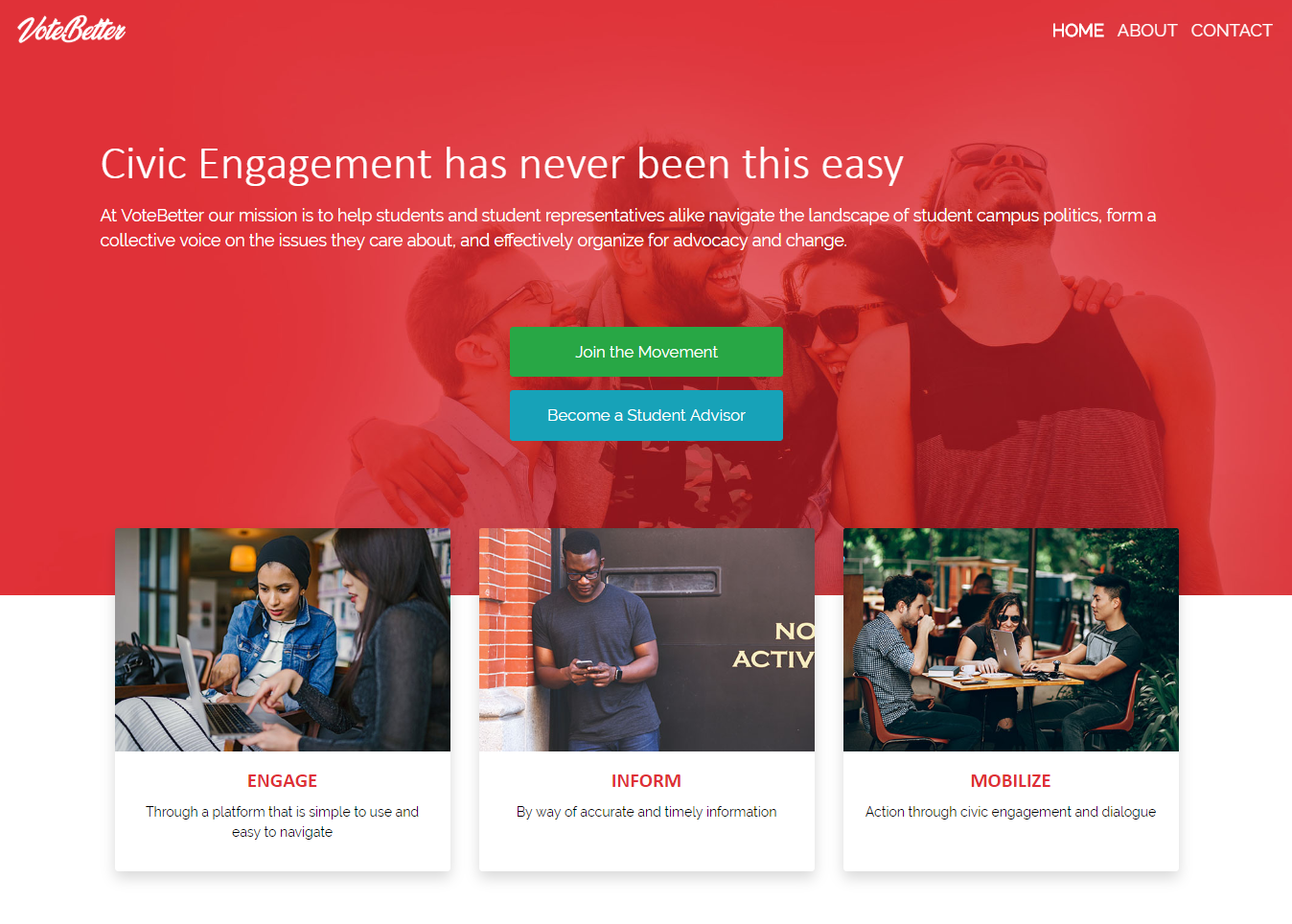SLN Creators is featuring Stephanie Cheung, the founder of VoteBetter — an app that keeps students informed on the structures, processes, and roles of student governments, invites students to crowdsource hot topics on their campus for elected representatives to address, and holds representatives accountable through the meticulous tracking of deliverables.

What inspired you to create VoteBetter?
Simple. I saw the potential that communities have to grow and thrive when everyone contributes. I am a big proponent of cultivating knowledge and sharing it with members of a community so that we are all empowered to shape the programs and services that affect us.
Student societies are large governing bodies with revenue generated from their electorate and a mandate to serve their constituents. When I was a student politician at Ryerson University, I certainly felt that there were ways in which democratic processes could be improved. VoteBetter seeks to provide the necessary infrastructure for these kinds of conversations to take place in a meaningful and accessible way.
And how has it been going so far?
So far it’s been going great! The project took off in January 2019 when I sent out a survey re: student campus politics to my peers on Facebook. Since then, I have put together a team of postsecondary students and alumni that are passionate about the cause. We also created a demo video of our prototype and launched our landing page.
What roadblocks have you run into?
In school, I majored in criminology and minored in psychology, so some of the more technical aspects of the initiative can present a good challenge. Business concepts such as product development, market segmentation, and financial modeling are all pretty new to me. Making time to learn about these concepts and knowing when and where to go for support has been essential for tackling these roadblocks.

So what’s the plan? What’s next for you and VoteBetter?
There are a few things we’re currently working on: building our dream team (we’re looking for student advisors!), sharing our landing page with the postsecondary community, and applying for incubation and funding.
Tell us about some people or resources in your life that have helped with this.
Our software developers Matt Welke and Eldon Gonio have been integral to the creation of the landing page and bringing this vision to life. I’d also like to give a shout-out to the civic tech community in Toronto, which has been a great place to meet like-minded individuals passionate about civic innovation. Lastly, I would be remiss not to thank all of the postsecondary students who took the time to talk to me about their experiences with student campus politics and their hopes for what the future of campus politics holds!

How are you managing to balance your other commitments with VoteBetter?
Over the years, I’ve learned to become more disciplined with my use of time. Outside of my 9-5 (which I love), I’m either investing in my learning, relationships, or personal wellbeing.
That last piece is crucial. When what you do is tied to social activism and your core values and principles, there exists a delicate balance between being rejuvenated by your work and burning out. For me, staying physically healthy and mentally motivated is the key to balancing and executing commitments in all domains of my life.
How do you deal with rejection when it comes to building VoteBetter?
So far we’ve received a lot of support for the platform. However, that is not to say that we haven’t dealt with rejection. Whether it comes from an individual or an organization, rejection is just a fact of life. Not everyone will find value in what you are doing, and that’s okay. It’s important to know when to open up a dialogue and when to respect a boundary.
Above all, remember that innovation inherently involves risk and the process of validated learning. You have to be agile and nimble to succeed. Learning to accept rejection and better articulate what you’re doing for the right audience is a big part of that. Failure can indicate a direction in which to go next.

What skills are helping you to make this dream a reality?
1. Initiative: you are responsible for your dreams. Put yourself out there and learn to be vulnerable. No one will do that for you.
2. Flexibility: innovation involves a lot of uncertainty. Even the most seasoned entrepreneurs of our time will tell you that they didn’t have it all figured out. Position yourself in a way that is adaptable to change.
3. Critical thinking: time and resources are finite. Leverage the advice of your mentors and use your best judgment to determine what your priorities are. What activities are secondary or tertiary to your main objective?
What advice would you give to a student who wants to follow a similar path?
Learn how to articulate the foundation of your idea (otherwise known as your elevator pitch). This includes what you are trying to do, for whom, and why? Practice your pitch with friends and family, and incorporate their suggestions on what can be improved or made more clear.
Become a life-long learner. Reading blogs and academic literature, asking others for advice, reflecting on your lived experience, observing the experience of others, finding a workshop on Eventbrite, and joining a community on Meetup are just some of the ways in which you can challenge yourself to learn something new. This will help you approach challenges with a fresh perspective.
Stay curious and optimistic, and create an environment that facilitates the development of these qualities in your team.
Any books or articles you’d recommend young people to check out?
The Lean Startup by Eric Ries and Pitch Perfect by Bill McGowan. For individuals who are interested in creating their own web-based startup without any formal technical training in the field, these articles on Learning Design and the Design Dictionary are entirely helpful.
What’s something you wish you knew before you started VoteBetter?
There is nothing wrong with asking for help. At the same time, do not underestimate what you can accomplish yourself through hard work and determination. For me, everything that had to do with creating the VoteBetter prototype and filming our demo video was self-taught. It takes patience and practice to hone a new skill set but investing in enhancing your own capacity always pays off.
Who inspires you?
A former colleague and mentor of mine, Patrizia Volpe, whom I had the pleasure of working with in the Ontario Public Service. She leads with empathy, makes decisions informed by principle and practicality, and holds steadfast to the vision of change she is working on. She has taught me what it means to serve others with dignity, compassion, and integrity.
What advice would you give to high school students transitioning to postsecondary? And postsecondary students transitioning to their career?
I’m glad you asked! I’ve had the privilege of speaking to both groups of individuals so there’s a lot I can say.
For high school students transitioning to postsecondary:
Enjoy this period of self-discovery. Make new friends! Pursue your passions! Most importantly, remember to take care of yourself. Your education is important, but your health and wellbeing are even more so (plus that degree isn’t going to earn itself!)
And for postsecondary students transitioning to their career:
Know your impact statement—the change you want to make in the world and why. You can do this by reviewing your transcript for courses that you especially liked or did well in, and aspects of jobs you’ve had that you were and were not fond of. Reflect on your aptitudes, values, and interests. Self-awareness will give you a sense of purpose and direction as you look for a fulfilling and meaningful career.
What is the best piece of advice you’ve ever received?
Lots of people have good ideas. The thing that will set you apart from the rest is actually doing something about it and bringing your idea to life (from my friend Dom Bernard).
I also really appreciate the profound remarks that Steve Jobs shared in his 2005 Stanford Commencement address: “Remembering that I’ll be dead soon is the most important tool I’ve ever encountered to help me make the big choices in life. Because almost everything—all external expectations, all pride, all fear of embarrassment or failure—these things just fall away in the face of death, leaving only what is truly important. Remembering that you are going to die is the best way I know to avoid the trap of thinking you have something to lose. You are already naked. There is no reason not to follow your heart.”
How do you unwind?
Currently, by listening to jazz music, making a charcuterie board, and sitting down for some board games with family and friends. The colder months have felt particularly long this year. So, I can’t wait to get outdoors and start hiking now that we’re consistently hitting those double digits!
Thank you so much for having me on SLN! I’m always happy to connect with students and continue the conversation.

Connecting Students With Paid Freelance Gigs
*Opinions expressed are those of the author, and not necessarily those of Student Life Network or their partners.




